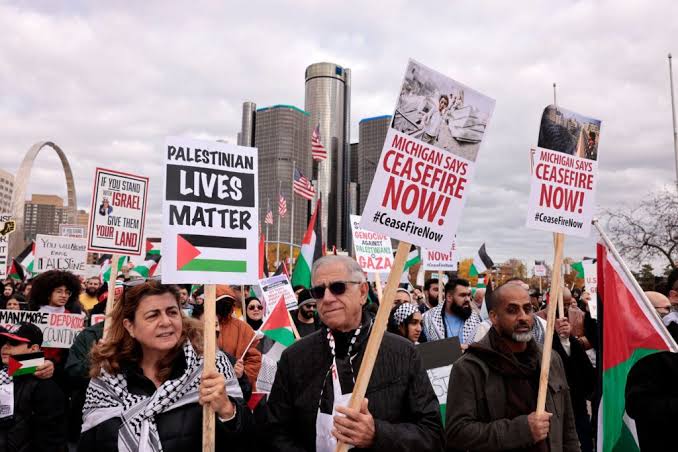

The recent decision by many Arab Muslim Americans in Michigan to reconsider their political support and shift toward the Republican Party is more than just a change in voting patterns; it’s a thoughtful reassessment of values and priorities. This shift, though unexpected to some, reflects a realistic approach by some Arab Muslim Americans to secure both immediate and lasting benefits, positioning them as key players in the U.S. political landscape.
Potential Gains for Arab Muslim Americans in Aligning with the Republican Party
Short-Term Benefits
Influence on Foreign Policy: Frustration with the Biden administration’s stance on Middle Eastern conflicts—especially its unconditional military and financial support for Israel’s war in Gaza—has stirred a deep sense of urgency. For many Arab Muslim Americans, aligning with Republicans presents a chance to advocate for a balanced approach to the Middle East. This includes seeking support for a two-state solution, limitations on aggressive military actions in Gaza and Lebanon, and a shared stance on countering Iran’s influence in places like Yemen, Syria, and Iraq, where Iranian-backed forces pose direct concerns.
Civil Rights and Freedom of Expression: Rising Islamophobia and increasing restrictions on pro-Palestinian expression have prompted Arab Muslim Americans to seek allies. Despite the Republican Party's traditional views on Islam and its known historical positions, many now see this alignment as a strategy to shield themselves from accusations of “anti-Semitism” in their advocacy for Palestinian rights. Here, the goal is to secure a voice free from fear or censorship on an issue central to their identity and beliefs.
Economic Incentives and Business Support: With many Arab Muslim Americans being small business owners, the Republican focus on reducing taxes and loosening regulations resonates. Aligning with a party that values economic freedoms is seen as a practical way to safeguard and expand their businesses, reinforcing the livelihoods that so many in the community have built.
Long-Term Gains
Strengthening Political Identity and Negotiation Power: This shift signals an evolution for Arab Muslim Americans—one where they are no longer tied to a single party but instead positioned as swing voters. This independent stance forces both parties to listen and respond to their concerns, creating a pathway for Arab Muslim Americans to advocate for meaningful representation in future policy discussions.
Greater Civic Representation and Political Candidacy: Embracing the Republican Party could inspire more Arab Muslim Americans to run for office under its banner, broadening the diversity of voices within the party. This participation not only expands political influence but also allows Arab Muslim Americans to assert their values directly within American political institutions.
Coalition Building Across Minority Groups: If this shift is successful, it could create new bonds with other minority groups who feel sidelined by traditional Democratic policies. In Michigan, where diverse communities hold significant influence, such alliances could amplify shared priorities and reshape the political landscape for everyone involved.
Media and Social Analysis
A Calculated Strategy in Response to Neglect: This shift is not a knee-jerk reaction but a conscious choice by Arab Muslim American leaders, like Hamtramck Mayor Dr. Amer Ghalib, who has recently challenged traditional party loyalties. The realignment reflects a growing belief that the Democratic Party has overlooked core issues affecting Arab Muslim Americans, from civil rights to foreign policy. By seeking allies who respect their values, Arab Muslim Americans are making a deliberate stand.
Redefining American Identity: This pivot also opens the door for Arab Muslim Americans to redefine how they are perceived in U.S. politics. No longer just a "minority group," they are emerging as a decisive force capable of shaping election outcomes. This redefined role underscores a maturity that values outcomes over partisanship, emphasizing a thoughtful and forward-looking approach to political engagement.
Contrasting Perspectives: A Moral Values Dilemma
While there are potential gains, some Arab Muslim Americans remain deeply troubled by the ethical complexities of aligning with Trump and the Republican Party. Concerns over Trump’s history of anti-Muslim rhetoric, his stance on key issues like recognizing Jerusalem as Israel’s capital, and his divisive rhetoric create a moral crossroads. For this group, the shift requires weighing immediate political and economic benefits against the potential compromise of their values, raising the question: is this a necessary trade-off, or are Arab Muslim Americans now choosing between two flawed options?
Conclusion:
The shift by Arab Muslim Americans could redefine political dynamics in Michigan and beyond, establishing them as a swing demographic that no party can afford to ignore. Republicans may seize this opportunity by adjusting their foreign policy or moderating certain stances, while Democrats may feel compelled to address issues dear to Arab Muslim Americans if they hope to win back support. Ultimately, this shift empowers Arab Muslim Americans, making them not just participants but influencers in the national conversation, with the potential to reshape future political strategies and policies in ways that matter deeply to them.
Latifa Jamel,
President of the American Center for Justice (ACJ).